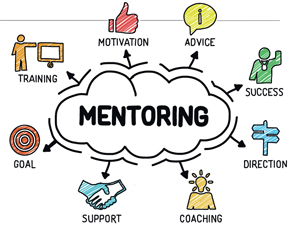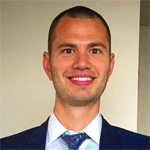
garagestock/shutterstock.com
Medicine has traditionally been an apprenticeship model. The most elemental and constructive method of passing on knowledge is the mentor–mentee relational experience. Mentorship encompasses not only the role of teacher, but also that of coach, role model, advisor and confidante.
Matthew J. Koster, MD, rheumatology fellow and instructor in medicine, Mayo Clinic, Rochester, Minn., can attest to the value of being mentored. “Having a mentor is a vital component of any physician’s mental growth and well-being,” he says. “At every level of my training in medicine, I have sought out mentors, because they are an essential part of my learning and growing process.”
Andreea Bujor, MD, a first-year rheumatology fellow at Boston University Medical Campus in Massachusetts, says, “The younger generation is in great need of good role models and leaders that they believe in and want to follow. Mentors shape our personality, and help us define our goals and achieve them.”

Dr. Koster
As a rheumatology fellow at Stanford University in Palo Alto, Calif., Matthew Baker, MD, says he was prompted to seek out a mentor when he was afforded opportunities in basic science, clinical trials, advanced degrees and industry collaborations. “Navigating these experiences and ultimately choosing the best path forward was challenging, and it was vital to gain insights from others who have traveled the same path,” he says.
Mentors reap rewards from the partnership as well. Kenneth J. Warrington, MD, chair, Division of Rheumatology, rheumatologist and professor of medicine, Mayo Clinic, Rochester, Minn., learns from his students and finds that he is able to accomplish more, because mentees are willing to devote significant time to assisting him with research projects. He also finds satisfaction in helping fellows reach their potential.
Making a Match

Dr. Bujor
The first step in finding a mentor is personal reflection and understanding yourself. “Identifying what is professionally important, determining clinical and research interests and setting short- and long-term goals are valuable guides,” Dr. Koster says. Then seek out a mentor who shares your interests and can help you achieve your goals. Former and current trainees or your program director can provide insight into who has a proven track record with prior mentees and who may be interested in taking on new mentees.
The next step is to meet with potential candidates. “Be prepared to discuss the interests and skills you want to develop or tasks you want to accomplish,” Dr. Koster says. “This helps the potential mentor determine if they are indeed the person who can help you reach your objectives. If they are not, perhaps they could recommend someone else.”

Dr. Baker
Some other key qualities to look for in a mentor is someone who shows interest in the mentee as a person, makes time to meet regularly, models respect and patience, communicates efficiently and effectively, and challenges those around them to learn and grow. “Ultimately, both the mentor and mentee have to mutually choose each other by agreeing to enter the relationship and commit to the defined purpose of the mentor–mentee experience,” Dr. Koster says.
Although personality is important, Dr. Baker points out that a mentor is not a friend in the traditional sense of the word. “It is better to choose someone [as a mentor] who can remain objective, impose structure and give criticism when necessary, rather than someone who takes a less rigorous approach due to overfamiliarity,” he says. “The ideal mentor is someone you enjoy being around, who is able to maintain a clearly defined role as a mentor and who always keeps the focus on the mentee’s development.”
Traditional Roles

Dr. Warrington
As someone who is responsible for the mentee’s career development, the mentor should assist with developing specific career goals and outcomes. A mentor should function as a role model, conducting themselves in a way that the mentee will recognize and incorporate. “‘Actions speak louder than words’ is key to mentoring,” says Richard Brasington, MD, FACP, professor of medicine, and rheumatology fellowship program director, Washington University School of Medicine St. Louis, Mo. “When my fellows are trying to make career decisions, the most useful thing that I can do is to listen to what they are saying and then reflect that back to the fellow. Sometimes, they will tell me what they want to do, but they have not realized it yet.”
Providing wisdom, which is gained through experience, is key. Many exposures to clinical, research and educational opportunities have shaped my current career. I share these experiences with my mentees,” says Kelly Rouster-Stevens, MD, MS, associate professor of pediatrics and pediatric rheumatology fellowship program director, Emory University School of Medicine/Children’s Healthcare of Atlanta. “Most have been positive, but some have been negative and are important to the learning process.”

Dr. Brasington
From a research perspective, a mentor should make time to discuss research projects, formulating and reviewing research protocols and grants, data interpretation, abstract preparation and editing manuscript drafts. “Regularly scheduled meetings are essential to review progress and allow time for adequate discussion,” Dr. Warrington says. “Assisting the mentee with making connections to other researchers and collaborators is also an important role.”
Important Attributes
Mentors should have a passion for their careers. “Without this, they will have a difficult time inspiring, guiding and encouraging mentees,” says Dr. Rouster-Stevens.

Dr. Rouster-Stevens
The mentor should lead by example and be able to engender enthusiasm by portraying a positive attitude. Experience in leadership roles allows the mentor to foster effective team building with the mentee. Moreover, a mentor should be approachable and collegial, Dr. Warrington says, while encouraging independence without being overprotective.
Dr. Brasington says it’s imperative that a mentor like to share their knowledge. They also need to be able to give frank, constructive criticism and to be honest with the mentee about what is realistic to accomplish.
Along these lines, a mentor needs to have a genuine interest in other people. “I need to understand who someone is in order to help them get to the next step, whether that involves entering academic medicine, clinical practice or something else,” says Philip Seo, MD, MHS, director of the Johns Hopkins Rheumatology Fellowship Program and director of the Johns Hopkins Vasculitis Center, Johns Hopkins University, Baltimore. “A mentor also has to be a fierce advocate for their mentees, even when that leads to making decisions that are unpopular among other faculty members.”
‘Ultimately, both the mentor & mentee have to mutually choose each other by agreeing to enter the relationship & commit to the defined purpose of the mentor–mentee experience.’ —Dr. Koster
Benefits of Having a Mentor

Dr. Seo
The advantages of having a mentor abound. Michael George, MD, fellow, Rheumatology, University of Pennsylvania, Philadelphia, Pa., points out that a mentor has a broad perspective and can be invaluable when developing a research project. “A mentor can help you focus your research interests into an answerable question and provide guidance on whether the project you are interested in is both important and feasible,” he says.
A mentor can also help a mentee gain access to data and other resources that are necessary to complete a project, and can help troubleshoot as a project moves forward. Importantly, a mentor can also use their connections to find other mentors and collaborators that can aid in a mentee’s success.
Finally, Dr. George says, “a mentor can help you look beyond the project at hand and push you to develop the skills, connections, funding and interests that will help you be successful not just in your current project, but in your career goals.”
Dr. Koster believes that having a mentor is an invaluable resource for physicians regardless of their age or level of training. “Mentors have wisdom and insight that they have gained from their successes and failures. These lessons, if effectively passed on to the mentee, can help the mentee to more effectively achieve the former and avoid the latter,” he says. “In addition, knowing that there is someone that cares for you personally and professionally reduces the level of isolation often perceived by trainees and can increase mental well-being, career satisfaction and production. For me, having a mentor that provides reassurance and guidance when I am trying to develop areas in which I have little or no experience allows me to challenge myself further than I would if I were left to my own reservations.” The mentor’s broader scope of vision provides the ability to see above and beyond barriers that mentees may perceive to be larger than they actually are.
A unique benefit that mentors possess is a detailed understanding of the field and personal and professional contacts that can significantly benefit the mentee. “What might take years to develop independently can sometimes be accomplished at one meeting with the right introductions,” Dr. Koster says. “Mentors can also be a sounding board for ideas, improve mentee performance through valuable feedback and refine a mentee’s clinical and life skills for effective practice. They will also get a foundation for learning good mentoring behaviors that can be used to mentor others.”
Having More Than One Mentor
Even if you have an “official” mentor, you can always spend time with and learn from others around you, Dr. Bujor says, as it is unlikely that you will find that one person who is best at everything. One may have excellent bedside manners, another superior knowledge in a certain disease, while someone else may have admirable research skills.

Dr. George
Adds Dr. George, “More experienced mentors may provide a broader perspective and more connections. Younger mentors may be better equipped to provide hands-on help with some of the minutia of the research process.”
Finding mentors outside of the rheumatology department can also be very helpful. “These potential mentors have a different skillset and a different perspective that may provide a new way to answer research questions,” Dr. George says. “A mentor does not need to have exactly the same interests, and sometimes having different interests and strengths is advantageous.”
Advantages of Mentoring
After only a short time working with his current mentor, Dr. Koster was provided opportunities that he did not think would be possible for several years. These include presenting at both national and international conferences, completing invited reviews and book chapters, collaborating with international experts on consensus guidelines and participating in and developing therapeutic trials.
Dr. Bujor has learned the most from her clinical mentor and always feels comfortable asking him questions about cases, even if he is not involved directly in a patient’s care. “He not only offers me the answer, but also helps me reason through it,” she says. “He can openly disagree with other attending physician’s choices, which is a great learning experience for me. He is also confident and logical in his clinical judgment. He is informal and not only advises about clinical situations, but also interpersonal communications in the workplace and physician–patient interactions.”
From a mentor’s perspective, Dr. Warrington says mentorship encourages professional growth through exposure to new ideas. The recognition that is awarded to a fellow also reflects positively on the mentor and drives personal satisfaction. In general, the mentor contributes to the advancement of rheumatology by developing the next generation of talented individuals.
As a mentor, Dr. Brasington says he has an enormous sense of pride in knowing that he helped someone get to where they are today. “Often, my former fellows will email me and write, ‘On hospital rounds today, I said exactly what you told me. It was as if you were speaking.’”
Karen Appold is a medical writer in Pennsylvania.
Reach Your Full Potential
Imagine the outcome of a plant growing in the wild vs. one being cared for by a farmer. Although a plant in the wild will take in whatever nutrients it can absorb, it’s limited by what is available and exposed to in an unpredictable environment. Now, consider the plant’s future if a farmer nurtures it by checking to ensure the soil and moisture are optimal for growth, provides extra nutrients when needed, prunes unproductive portions and protects it against illness or a harsh climate. “The latter plant will, of course, do better; invariably, so does the medical trainee with a mentor,” says Matthew J. Koster, MD, rheumatology resident and instructor in medicine, Mayo Clinic, Rochester, Minn.
Choose Your Own Path
“Trainees are often reluctant to identify long-term goals because choice entails loss,” says Philip Seo, MD, MHS, director of the Johns Hopkins Rheumatology Fellowship Program and director of the Johns Hopkins Vasculitis Center, Johns Hopkins University, Baltimore. “One cannot seize one opportunity without closing the door on another, but this is a good type of loss and is essential to developing a career. Choosing is good, because when one doesn’t choose, eventually choices are made for you.”
Key Qualities to Look for in a Mentor
Look for someone who:
- Shows interest in the mentee as a person;
- Makes time to meet regularly;
- Models respect and patience;
- Communicates efficiently and effectively; and
- Challenges those around them to learn and grow.


